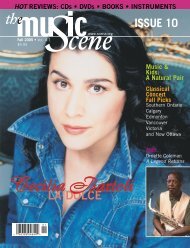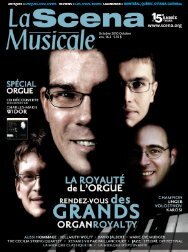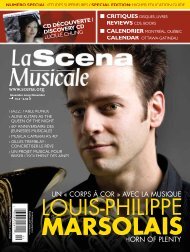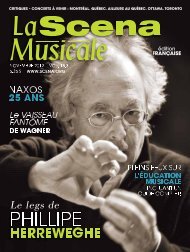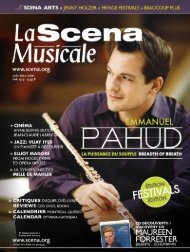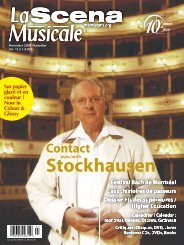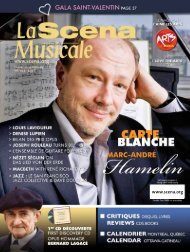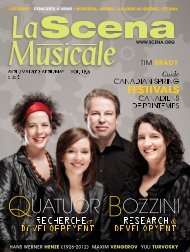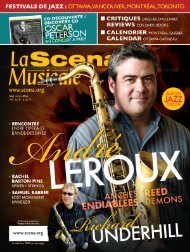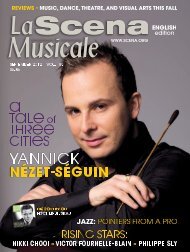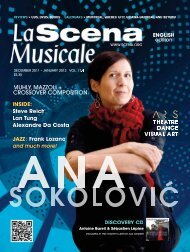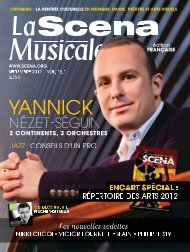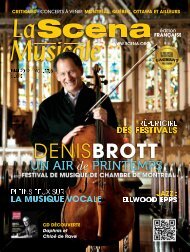The Bohlen-Pierce system - La Scena Musicale
The Bohlen-Pierce system - La Scena Musicale
The Bohlen-Pierce system - La Scena Musicale
Create successful ePaper yourself
Turn your PDF publications into a flip-book with our unique Google optimized e-Paper software.
ON THE COVER VENGEROV<br />
move to Moscow. <strong>The</strong> school hadn’t granted<br />
him a visa, however, and every few months<br />
they would have to make excuses with police<br />
officers. After three years, his grandfather became<br />
ill and they had to move back to Novosibirsk.<br />
<strong>The</strong>re, he studied with Zakhar Bron, who<br />
also counted Vadim Repin among his pupils.<br />
After Vengerov won the Wieniawski, invitations<br />
to perform in Europe and even Japan<br />
granted him a chance unimaginable for a poor<br />
kid who had grown up in Soviet Siberia: the<br />
ability to see the world. At age fourteen<br />
Vengerov played at the Concertgebouw. A year<br />
later, he not only won the Carl Fesch International<br />
Violin Competition, but the interpretation,<br />
press, and audience prizes. By sixteen he<br />
taught his first masterclass, at the University<br />
of California in Los Angeles.<br />
Vengerov had followed Bron to London and<br />
then Lübeck, Germany, but eventually his<br />
family settled in Israel, where his musical talent<br />
once again propelled him out of a destiny<br />
predestined by his country: a few days into<br />
mandatory military service he was granted an<br />
exemption.<br />
AN IMPORTANT SEED<br />
Seeing his father in the orchestra may have inspired<br />
him to take up the violin, but his<br />
mother’s musical job also made a lasting impression<br />
on Vengerov. “[She] was a choir conductor,”<br />
says Vengerov. “At the age of three I<br />
already visited her rehearsals in Siberia where<br />
she led her beautiful choir of 500 kids—she had<br />
a huge choir. I saw the passion that my mom<br />
had for kids when she was working with them.<br />
I’m sure she has planted an important seed. She<br />
wanted at some point also to become a symphony<br />
conductor but she couldn’t realize her<br />
dream because I was born. I started to play the<br />
violin, so she dedicated a lot of her time to me.”<br />
His professional ‘detour’ as a violinist serves<br />
him well as a conductor: Vengerov speaks of<br />
his knowledge of string instruments as well as<br />
“my way of breathing in music, the phrasing, the<br />
colouring, and all the technical things that I’ve<br />
acquired as a violinist” as key to his developing<br />
skills as a conductor. Having long experienced<br />
conducting from the other side of the<br />
podium, Vengerov has firm ideas about how to<br />
run a rehearsal that flows logically for the musicians.<br />
His ultimate goal as a conductor is to<br />
“be the advocate of this composition, of this<br />
composer. I have to again recreate this work as<br />
if it is the absolute premiere and this work has<br />
never been heard before. With my orchestra I<br />
have to convince the audience that this is the<br />
absolute best composition that was ever written.<br />
At this moment nothing else exists. We<br />
6<br />
APRIL 2012<br />
“I THINK EVERY EXPERIENCE THAT I HAVE IN MUSIC, IN LIFE WILL DEFINITELY BENEFIT MY PROFESSION.<br />
I never wanted to lock myself in a small room but always wanted to explore new territories.”<br />
have to be the perfect channel as musicians between<br />
the composer and the audience.”<br />
His mother’s profession also sparked an interest<br />
in teaching and working with children.<br />
Since giving his first masterclass, he has instructed<br />
at various institutions, including at<br />
Saarbrucken. He became a professor there at<br />
only 26 and was so dedicated to teaching that<br />
he sometimes cut his concert schedule down<br />
by almost two thirds. After being appointed a<br />
visiting professor at the Royal Academy of<br />
Music in 2005, Vengerov was named the inaugural<br />
Menuhin Professor of Music there in<br />
February 2012. But what touches a real emotional<br />
chord for him is his global outreach for<br />
children. Vengerov was the first classical musician<br />
to be made a UNICEF ambassador and<br />
he also supports MIGDAL and MIAGI, two<br />
similar programs.<br />
“I’ve been very fortunate to travel where<br />
they’ve never heard a symphony,” says<br />
Vengerov. “I’ve been in Thailand with hill tribe<br />
communities and in Chiang Mai. <strong>The</strong>y had<br />
never heard the orchestra, but they have such<br />
beautiful music. <strong>The</strong>y shared with me their<br />
own handmade instruments. We danced and<br />
we played together. What really struck me was<br />
that in the beginning when I entered a classroom,<br />
say of Ugandan kids who have suffered<br />
the trauma of war–they hardly want to communicate.<br />
But then with music they open their<br />
hearts and we find a way to communicate with<br />
each other through music. Really, music has<br />
no barriers. Where words are not powerful<br />
enough then there comes music.” In 2007<br />
Vengerov received the World Economic<br />
Forum’s Crystal Award for his betterment of<br />
the world through art.<br />
BREAKING BARRIERS<br />
Vengerov breaks down barriers within music<br />
as well. “I think every experience that I have in<br />
music, in life will definitely benefit my profession.<br />
I never wanted to lock myself in a small<br />
room but always wanted to explore new territories,”<br />
he says. Long before the injury and the<br />
more serious pursuit of conducting, Vengerov<br />
had showed interest in deviating from the<br />
straight and narrow classical violin path. In<br />
the late nineties, Vengerov started studying<br />
Baroque violin, and even had the violin he<br />
used as a teenager—which turned out to be a<br />
<strong>La</strong>ndolfi—be remodeled back to its original<br />
Baroque style. In 2000 he toured Europe with<br />
harpsichordist Trevor Pinnock in a sort of<br />
‘styles reversed’ programme, featuring him on<br />
Baroque violin and Pinnock on piano. In 2002,<br />
Vengerov started playing the viola, initially in



